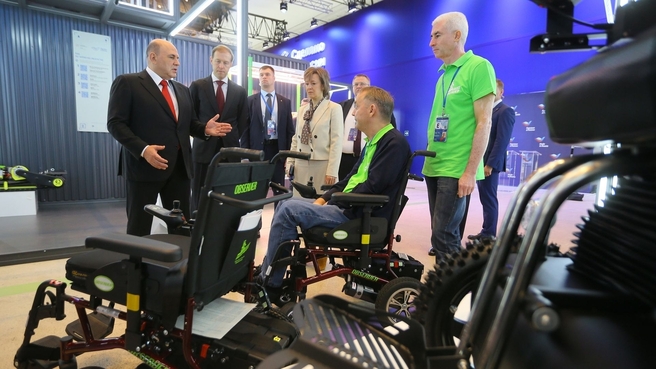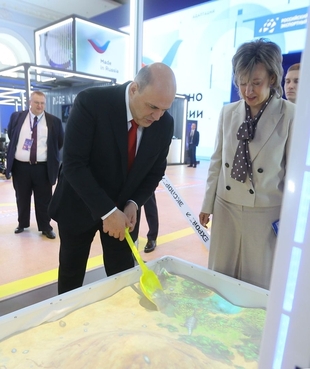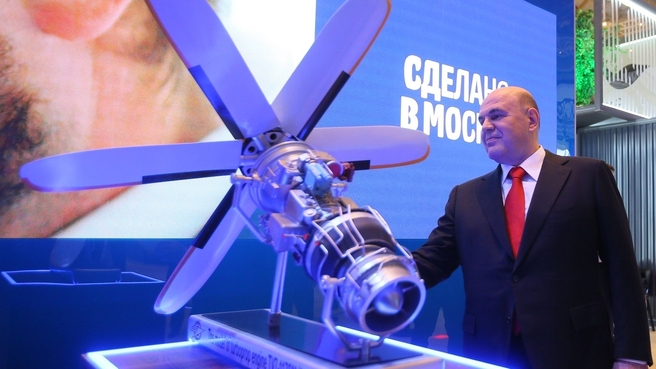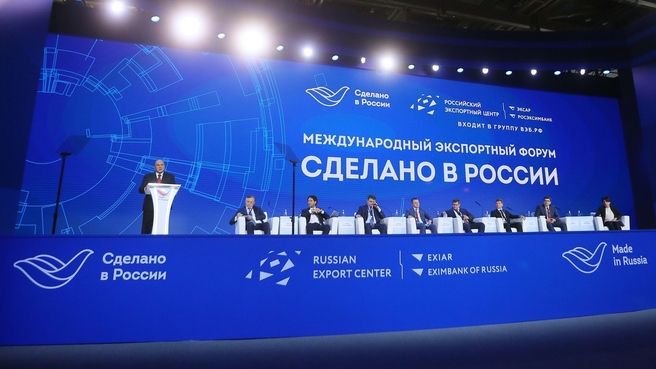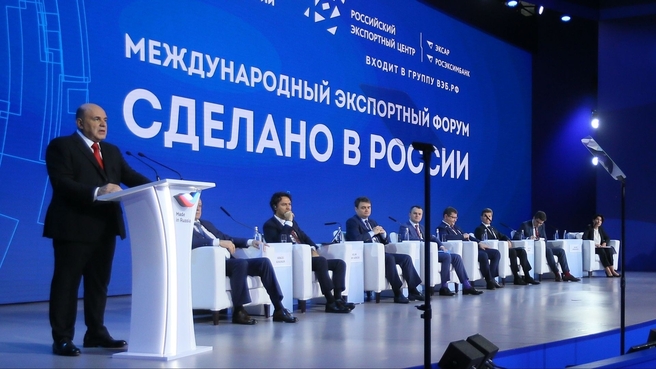The Prime Minister toured the exhibition of the Made in Russia 2022 participants and spoke at the forum’s plenary session, Economy of Change: Creating New Exports Geography.
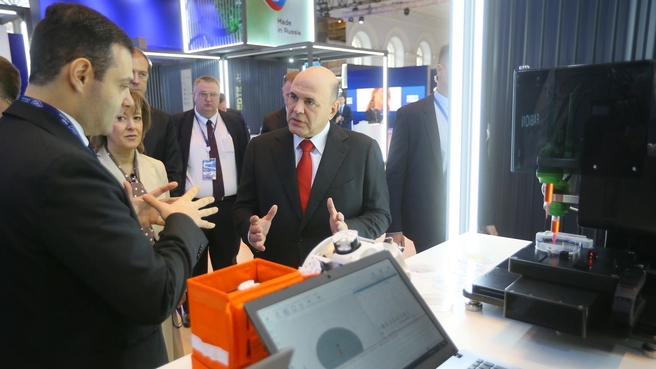
Mikhail Mishustin at the stand of the 3D Bioprinting Solution biotech research laboratory (Russia’s first bioprinter using patient cells). Comments by Managing Partner Yusef Khesuani
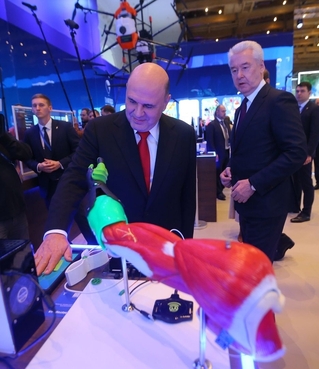
Mikhail Mishustin at the stand of the 3D Bioprinting Solution biotech research laboratory (Russia’s first bioprinter using patient cells). With Moscow Mayor Sergei Sobyanin
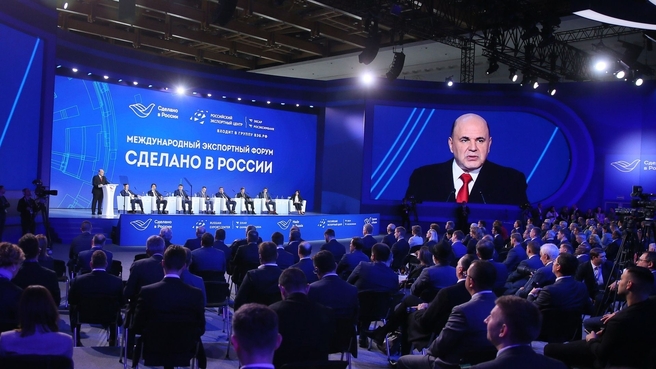
Mikhail Mishustin speaks at the plenary session of the Made in Russia 2022 International Export Forum
Mikhail Mishustin at the Observer stand. With Denis Manturov and Observer CEO Roman Aranin
Made in Russia is the country’s main expert forum dedicated to enhancing support of Russian producers and reshaping Russia’s trade and economic relations with foreign countries. The forum defines trends in export development, demonstrating opportunities that the Government and development institutions offer to exporters. The forum has been held since 2012.
The forum exhibition showcases the best examples of hi-tech export products manufactured in different Russian regions, especially knowledge-intensive and innovative solutions, arranged in technology clusters: Industrial Production, HealthTech, Transport and Mobility, ESG/Sustainable Development, Smart City Infrastructure, EdTech and Creative Industries.
At an interactive exhibition, the country’s regions, including Moscow and St Petersburg, the Novosibirsk and Sverdlovsk regions, and the republics of Crimea and Tatarstan, present their unique products and R&D achievements.
Mikhail Mishustin’s remarks at the plenary session:
Good afternoon, forum participants and guests.
I am delighted to welcome you to the Made in Russia International Export Forum. It has become an excellent venue for a substantive dialogue on the tasks and challenges in global trade. We can use it to exchange experience and find interesting business solutions and, of course, business partners.
The main theme of today’s plenary session is The Economy of Change: Creating a New Export Geography.
This year, our economy came against extremely difficult system-wide challenges, including in foreign trade. The declared rules of cooperation, which seemed impregnable in the past, are being openly disregarded in the West. There is no fair competition anymore, with many decisions based on open protectionism or short-term political goals.
The unfriendly countries are introducing more and more sanctions to do as much damage as possible to our industry and financial system and to intimidate our business community. Frankly speaking, they have stolen hundreds of billions of dollars from Russia’s foreign currency reserves.
Terrorist attacks have been staged on the gas transportation infrastructure.
There is no stopping our opponents, even through many markets are interconnected in the open global economy and their actions ultimately boomerang at them. They have already come up against record price hikes and soaring prices of gas, electricity, petroleum and bread. Many of the so-called industrialised countries which only recently were proud of green technology are returning to coal as a source of energy.
Of course, the intention to exclude Russia from global trade looks absurd. Our country has been and remains a vital part of global trade, and it is very difficult to imagine global industries working without Russian resources and products.
Under these circumstances, we should pursue a comprehensive economic policy supporting all spheres that are related to the country’s export capabilities, primarily stronger domestic production and the services sector.
Acting on the Presidential instructions, the Government has prepared a number of important decisions.
All of them have been added to the plan of priority measures to ensure the development of the Russian economy amid external sanctions. These measures largely provide for saturating the domestic market with goods that are also important for the normal operation of the companies themselves.
We have increased the authorised capital of regional industry funds. Resources have been allocated for stimulating research and design in essential areas. Industrial and technological parks are being developed.
We continue working to increase the potential of our industries. As per the President's instructions, we are coordinating conditions for launching the mechanism of industrial clusters in a new format. In particular, there are plans to issue low-interest loans under projects aimed at creating vital and most-in-demand products.
Measures are being taken to attain the long-term goals formulated by the President. For example, new assistance mechanisms are being created and adapted to exporters’ requirements within the framework of the International Cooperation and Exports national project.
We are using a package of financial assistance measures, such as loan restructuring, insurance and subsidies for skyrocketing expenditures, including in logistics. We help our companies look for markets and trading partners in friendly countries and introduce local companies to products made by Russian companies.
We also welcome private initiative. Today we have seen several interesting and promising projects at the forum in widely different spheres, from equipment for biotechnology research and the creation of barrier-free environment to the manufacturing of electric engines and electric vehicle charging stations.
As for non-raw material non-energy exports as a whole, its nominal value in the first eight months of this year has increased by 7 percent year on year and reached $1225 billion, even though the physical volume of deliveries has decreased.
Inevitably, the geography of deliveries to foreign countries is changing. The considerable shrinking of trade with the United States, the UK, Japan, and a number of other countries, whose political leadership has erected barriers to normal cooperation, is proceeding in parallel with the growth of trade with other, friendly partners.
For example, industrial exports to BRICS countries have expanded substantially. There is great dynamism in trade with Türkiye, Egypt, and the United Arab Emirates.
The European countries have refused to buy Russian iron and steel products, thereby perceptibly increasing their costs. But rolled metal supplies are already on the rise to the Asia Pacific Region and the CIS countries. Keeping in mind the Chinese economy, shipments of these and other Russian products to Asian countries can grow even further.
Reformatting markets is certainly a slow and labour-intensive process requiring extensive preparations, including the effort to build a new financial architecture. The important thing is to ensure a transition to payments in national currencies. In this connection, we are expediting the readjustment of the reciprocal payments mechanism used by us and our partners, including through acceding to alternative payments systems and creating sophisticated hi-tech forms of payment.
In effect, a task unprecedented in its scale is being addressed, with entrepreneurs, the Government and development institutions creating in real time a new geography of our country’s trade and economic cooperation.
Despite outside pressure, we have confidence in our strength and are open to a constructive and mutually beneficial work with foreign partners.
While developing new markets, we should not forget about our business partners of long standing. It has been confirmed that there is a steady demand for sawn timber, paper pulp, and packing in the Asia Pacific Region and for fertilisers in Latin America. Fat and oil sales, particularly to the Middle East, are growing steadily. We continue exporting grain to Egypt, Türkiye, the Gulf area, as well as to African and Asian states. This year, meat supplies to Saudi Arabia, as well as to CIS and North African countries have almost doubled.
In some sectors, sanctions have failed to obstruct the transition to higher value-added exports. This year, for example, we have increased processed fish deliveries to Asia and even Europe.
Small and medium-sized businesses are definitely having the hardest time in the current situation.
Their revenues are not high, and their financial resources are limited. But at the same time, many of them have important advantages. They are operating in world markets thanks to the strong personal ties and trust they have built with their partners in other countries who are interested in overcoming difficulties together.
Many small and medium-sized businesses manufacture innovative and unique products that can open up new foreign market niches for Russia. Helping and supporting them is a priority for the Government and our development institutions.
The International Cooperation and Exports and the SMEs and Support for Individual Entrepreneurship national projects are aimed at this.
One of the most important goals at this stage is to reformat logistics. Before unfriendly countries imposed restrictions on Russia, all transport services for Russian goods heading abroad were provided by eight major international companies. These companies have left the Russian market, but goods are being exported anyway. We have our own, domestic carriers that have opened new transport lines and routes with friendly countries.
Thanks to the relevant companies’ rapid response to the changing conditions, thousands of exporters now have access to new markets.
We are working with our reliable partners to expand transport and logistics corridors. The Government has identified three key areas for infrastructure development – the Sea of Azov-Black Sea, as well as the Eastern and Caspian regions. They are the foundation for expanding trade and economic ties.
Together with businesses and regional authorities, we are now testing solutions that will speed up the handling of goods many times over.
In the eastward direction, shipments of non-primary goods to the Asia-Pacific countries are growing rapidly. To promote exports to Iran, the Middle East and South Asia, we are making an effort to expand the western route of the International North-South Transport Corridor. We plan to increase the freight traffic there to 15 million tonnes per year by 2030 with our partners in the Caspian region. Further plans include organising end-to-end logistics from northwestern Russia, the Urals, and Russia’s central regions to the ports of the Persian Gulf and further around the world.
Colleagues,
The global economy is now in transition. The balance of decision-making centres is changing. Russia is closely integrated into this process and will actively and constructively contribute to creating a more equitable and effective arrangement for all countries.
We have a high industrial potential and a strong financial system. But most importantly, Russia has strong bilateral relations with key participants in this new, multipolar global economic architecture. We support the expansion of trade and investment; we strive for greater prosperity and stability. And when people are united by a common goal and determination to achieve it, they can do anything.
I am sure that a lot of interesting ideas and proposals will be put forth at the forum today. The most relevant of them will certainly be used in our further work to create more favourable conditions for the development of international trade.
I wish the forum participants good luck and all the best.
